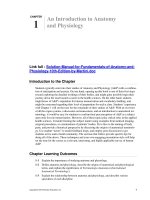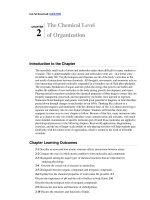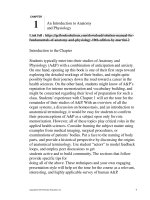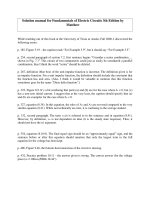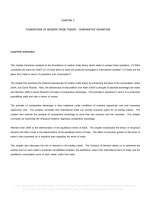Testbank and solution manual for fundamentals of informations system 8e (1)
Bạn đang xem bản rút gọn của tài liệu. Xem và tải ngay bản đầy đủ của tài liệu tại đây (254.67 KB, 11 trang )
Fundamentals of Information Systems, 8th Edition
Solutions – Chapter 2
Ethical & Societal Issues
Digital Software Systems May Improve Nuclear Power Plant Safety
Discussion Questions
1. The purpose of a reactor protection system (RPS) is to protect the integrity of the
plant’s nuclear fuel by monitoring inputs from the reactor core. To accomplish
this monitoring, application software must check sensors located throughout the
reactor. If any safe operating values are exceeded, the software takes action, such
as injecting cooling water or shutting the reactor down by inserting control rods.
2. Advantages of proprietary software:
You can get exactly what you need in terms of features, reports, and so on.
Being involved in the development offers control over the results.
You can modify features that you might need to counteract an initiative by
competitors or to meet new supplier or customer demands.
Disadvantages of proprietary software
It can take a long time and significant resources to develop required
features.
In-house system development staff may be hard pressed to provide the
required level of ongoing support and maintenance because of pressure to
move on to other new projects.
The features and performance of software that has yet to be developed
presents more potential risk.
Advantages of off-the-shelf software
The initial cost is lower because the software firm can spread the
development costs over many customers.
The software is likely to meet the basic business needs—you can analyze
existing features and the performance of the package before purchasing.
The package is likely to be of high quality because many customer firms
have tested the software and helped identify its bugs.
Disadvantages of off-the-shelf software
An organization might have to pay for features that are not required and
never used.
The software might lack important features, thus requiring future
modification or customization. This lack can be very expensive because
users must adopt future releases of the software as well.
The software might not match current work processes and data standards.
Fundamentals of Information Systems, 8th Edition
Critical Thinking Questions
1. Using software to control power plants offers the potential of increased safety
compared to earlier methods.
2. Student responses will vary. Some may suggest that programmers who write
software for these system be required to pass standardized official examinations.
Information Systems @ Work
Printing Livers at Organovo
Discussion Questions
1. To create human tissues and organs, scientists must build highly customized
artificial scaffolds to seed the cells temporarily until they are strong enough to
stand alone. 3D printing can help because unlike other manufacturing devices, 3D
printers have a unique ability to customize a product by tweaking the blueprint
that is fed into the printer.
2. Potential uses include complex engine parts, aircraft wings, and on-demand parts
in space.
Critical Thinking Questions
1. Organova has a competitive advantage in the production of tissues and body parts.
2. Student responses will vary. They should note that even though the research was
funded by the U.S. government, Organovo holds all the patents. Therefore, one
could argue that Organovo should be the sole financial beneficiary.
Review Questions
1. Green computing has three goals: reduce the use of hazardous material, allow
companies to lower their power-related costs (including potential cap and trade
fees), and enable the safe disposal or recycling of computers and computer-related
equipment.
2. RAM is temporary and volatile; RAM chips lose their contents if the current is
turned off or disrupted. Read-only memory (ROM) is usually nonvolatile. In
ROM, the combination of circuit states is fixed, and therefore its contents are not
lost if the power is removed. ROM provides permanent storage for data and
instructions that do not change.
Fundamentals of Information Systems, 8th Edition
3. RFID technology employs a microchip with an antenna that broadcasts its unique
identifier and location to receivers. One popular application of RFID is to place
microchips on retail items and install in-store readers that track the inventory on
the shelves to determine when shelves should be restocked. The Canadian
government is also supporting a move to require the sheep industry to use RFID
chips to enable a “farm to fork” traceability system. RFID technology can also be
used for asset tracking.
4. A blade server houses many computer motherboards that include one or more
processors, computer memory, computer storage, and computer network
connections. These all share a common power supply and air-cooling source
within a single chassis. By placing many blades into a single chassis, and then
mounting multiple chassis in a single rack, the blade server is more powerful but
less expensive than traditional systems based on mainframes or server farms of
individual computers. In addition, the blade server approach requires much less
physical space than traditional server farms.
5. The arithmetic logic unit (ALU) performs mathematical calculations and makes
logical comparisons. The control unit sequentially accesses program instructions,
decodes them, and coordinates data flows in and out of the ALU, registers,
primary storage, secondary storage, and various output devices.
6. Solid state storage devices (SSDs) store data in memory chips rather than
magnetic or optical media. These memory chips require less power and provide
faster data access than magnetic data-storage devices. In addition, SSDs have few
moving parts, so they are less fragile than hard disk drives. All these factors make
the SSD a preferred choice for portable computers.
7. A laptop computer is a personal computer designed for use by mobile users, being
small and light enough to sit comfortably on a user’s lap. Laptop computers use a
variety of flat-panel technologies to produce lightweight and thin display screens
with good resolution.
Numerous portable computers are smaller than the typical laptop and have various
names, including notebook and the even smaller ultrabook. The newest notebook
computers come with a natural user interface, including both voice control
integration and touch screens
Tablet computers are portable, lightweight computers that can come with or
without a keyboard and allow you to roam the office, home, or factory floor
carrying the device like a clipboard. You can enter text with a writing stylus
directly on the screen, thanks to built-in handwriting recognition software.
Fundamentals of Information Systems, 8th Edition
8. The Green Electronics Council manages the Electronic Product Environment
Assessment Tool (EPEAT) to assist in the evaluation and purchase of green
computing systems. The EPEAT assesses products against 51 life cycle
environmental criteria developed by representatives of the environmental
community, manufacturers, private and public purchasers, resellers, recyclers, and
other interested parties.
9. Examples of smartphone operating systems include Windows 8, Apple’s iOS, and
Android.
10. Software as a service (SaaS) allows businesses to subscribe to Web-delivered
business application software by paying a monthly service charge or a per-use fee.
SaaS can reduce expenses by sharing its running applications among many
businesses.
11. An application programming interface (API) is a set of programming instructions
and standards for one software program to access and use the services of another
software program.
12. Operating systems use the following five basic task management techniques to
increase the amount of processing that can be accomplished in a given amount of
time:
Multiuser: Allows two or more users to run programs at the same time on
the same computer. Some operating systems permit hundreds or even
thousands of concurrent users. The ability of the computer to handle an
increasing number of concurrent users smoothly is called scalability.
Multiprocessing: Supports running a program on more than one CPU.
Multitasking: Allows more than one program to run concurrently.
Multithreading: Allows different threads of a single program to run
concurrently. A thread is a set of instructions within an application that is
independent of other threads. For example, in a spreadsheet program, the
thread to open the workbook is separate from the thread to sum a column
of figures.
Real time: Responds to input instantly. To do this, the operating system
task scheduler can stop any task at any point in its execution if it
determines another higher priority task needs to run immediately. Such
systems are used to control the operation of jet engines, deployment of air
bags, the operation of anti-lock braking systems, and other real-time
operations.
13. The Linux distributor takes the code from different programs and combines it into
a single operating system that can be installed on a computer. The distributor may
also add finishing touches, such as what the desktop looks like, what color
schemes and character sets are displayed, and what browser and other optional
software is included with the operating system.
Fundamentals of Information Systems, 8th Edition
14. One of the greatest advantages of using a 64-bit version computer is the ability to
access physical memory (RAM) above the 4-gigabyte (GB) range, which is not
addressable by 32-bit computers. The 4-GB limit can be a severe problem for
servers and computers accessing large databases.
15. An embedded system is a computer system (including some sort of processor) that
is implanted in and dedicated to the control of another device. Embedded systems
control many devices in common use today, including TV cable boxes, cell
phones, digital watches, digital cameras, MP3 players, calculators, microwave
ovens, washing machines, and traffic lights.
16. The term cloud computing refers to the use of computing resources, including
software and data storage, on the Internet (the cloud) rather than on local
computers. Rather than installing, storing, and running software on your own
computer, with cloud computing, you use the Web browser to access software
stored and delivered from a Web server. Typically the data generated by the
software is also stored on the Web server. Cloud computing provides the benefit
of being able to easily collaborate with others by sharing documents on the
Internet.
Cloud computing involves some risks, however. For example, sensitive
information could be compromised in a number of ways, including unauthorized
access by employees or computer hackers; the host might not be able to keep its
computers and network up and running as consistently as necessary; or a disaster
could disable the host’s data center, temporarily putting an organization out of
business.
17. Workgroup application software is designed to support teamwork, whether people
are in the same location or dispersed around the world. This support can be
accomplished with software known as groupware that helps groups of people
work together effectively. Examples of workgroup software include group
scheduling software, electronic mail, and other software that enables people to
share ideas. Lotus Notes and Domino are examples of workgroup software from
IBM.
18. Middleware is software that allows various systems to communicate and
exchange data. Middleware is often developed to address situations where a
company acquires different types of information systems through mergers,
Fundamentals of Information Systems, 8th Edition
Discussion Questions
1. Organizations that don’t make wise hardware investments are often stuck with
outdated equipment that is unreliable and that cannot take advantage of the latest
software advances. Such obsolete hardware can place an organization at a
competitive disadvantage. Managers, no matter what their career field and
educational background, are expected to help define the business needs that the
hardware must support. In addition, managers must be able to ask good questions
and evaluate options when considering hardware investments for their areas of the
business. This need is especially true in small organizations, which might not
have information system specialists.
2. Software upgrades are an important source of increased revenue for software
manufacturers and can provide useful new functionality and improved quality for
software users.
3. It could be argued that with no hard disk, thin clients never pick up viruses or
suffer a hard disk crash. Unlike personal computers, thin clients download
software from a network when needed, making support, distribution, and updating
of software applications much easier and less expensive.
4. 3D printing technology takes a three dimensional model of an object stored on
your computer and sends it to a 3D printer to create the object using strands of a
plastic filament or synthetic powder. The filament comes in spools of various
colors and is fed through a heated extruder that moves in several directions to
place layer upon layer on top of each other until the object is created.
3D printing is commonly used by aerospace firms, auto manufacturers, and other
design-intensive companies.
5. Responses will vary. Tablet computers often include a variety of software and
communications capabilities. Most can communicate with desktop computers
over wireless networks. A smartphone combines the functionality of a mobile
phone, camera, Web browser, e-mail tool, MP3 player, and other devices into a
single handheld device.
6. Important operating system features could be an attractive, easy to use user
interface, file protection, system restore capabilities, security features, such as a
security center and firewall, and troubleshooters.
7. SaaS can reduce expenses by sharing its running applications among many
businesses. Note that providing one high-quality SaaS application to thousands of
businesses is much more cost-effective than custom designing software for each
business.
Fundamentals of Information Systems, 8th Edition
SaaS does involve some risks. For example, sensitive information could be
compromised in a number of ways, including unauthorized access by employees
or computer hackers; the host might not be able to keep its computers and
network up and running as consistently as necessary; or a disaster could disable
the host’s data center, temporarily putting an organization out of business. It can
also be difficult to integrate the SaaS approach with existing software.
8. The student might recommend a sight interface, which uses a camera on the
computer to determine where a person is looking on the screen and performs the
appropriate command or operation.
9. For most companies, the spheres of influence are personal, workgroup, and
enterprise. Information systems that operate within the personal sphere of
influence serve the needs of an individual user. These information systems enable
their users to improve their personal effectiveness, increasing the amount of work
they can do and its quality. Such software is often referred to as personal
productivity software.
A workgroup is two or more people who work together to achieve a common
goal. An information system that operates in the workgroup sphere of influence
supports a workgroup in the attainment of a common goal.
Information systems that operate within the enterprise sphere of influence support
the firm in its interaction with its environment.
10. Sources of application software are proprietary software and off-the-shelf
software. An advantage of proprietary software is that you can get exactly what
you need in terms of features and reports. A disadvantage however is that it can
take a long time, plus significant resources, to develop required features. An
advantage of off-the-shelf software is that the initial cost is lower since the
software firm is able to spread the development costs over a large number of
customers. One disadvantage is that the organization may have to pay for features
that are not required and are never used.
11. The operating system for a mainframe computer can accommodate hundreds or
thousands of users at the same time. The operating system for a laptop computer
allows one user at time to operate the computer. The operating systems for both
executes the following activities:
Performing common computer hardware functions
Providing a user interface
Providing a degree of hardware independence
Managing system memory
Managing processing tasks
Providing networking capability
Controlling access to system resources
Managing files
Fundamentals of Information Systems, 8th Edition
12. Students might use spreadsheet software such as Excel, database software such as
Access, and financial software such as Quicken.
13. Grid computing is the use of a collection of computers, often owned by many
people or organizations, to work in a coordinated manner to solve a common
problem. Grid computing is one low-cost approach to parallel processing. The
grid can include dozens, hundreds, or even thousands of computers that run
collectively to solve extremely large parallel processing problems. Cloud
computing refers to the use of computing resources, including software and data
storage, on the Internet (the cloud) rather than on local computers.
Parallel computing is the simultaneous execution of the same task on multiple
processors to obtain results faster. The most frequent uses for parallel computing
include modeling, simulation, and analyzing large amounts of data.
Problem-Solving Exercises
1. Responses may include the following information:
2013
Smartphones 250,231,000
Tablets
60,016,000
2012
171,652,000
118,883,000
2011
149,041,000
182,457,000
2010
101,150,000
369,258,000
2. Students should outline several measures that could be taken to ensure the
accuracy of a large spreadsheet that is used to make key business decisions.
3. Students should imagine that they are going to buy a smartphone to improve their
communication capabilities and organizational abilities and submit a report that
discusses the tasks they would need it to perform and its features.
Team Activities
1. Students should visit a data center or server farm with one or two of their
classmates.
2. Students should visit a retail store that employs Radio Frequency Identification
chips to track inventory and interview an employee involved in inventory control.
3. Students should interview people on the topic of modifying off-the-shelf software
packages.
Fundamentals of Information Systems, 8th Edition
Web Exercises
1. The three fastest supercomputers are NUDT Tianhe-2A (China), Cray Titan
(USA), and BM Sequoia Blue Gene/Q (USA).
2. In 2012, Apple notified the EPEAT that it was withdrawing its products from its
registry citing incompatibility with Apple’s design direction and EPEAT’s
requirements. The company reversed its decision after public outcry.
3. Students should use the Web to find multiple reviews and reports on four different
personal productivity software suites from various vendors.
Career Exercises
1. Students should examine the possibility of a career in computer hardware sales
and discuss the area of sales they believe holds the brightest prospects for young
college graduates.
2. Students should identify three specific smartphone applications that would greatly
help them in their current or next job.
3. Student responses will vary. The project team could include managers in
marketing, sales, human resources, finance, and accounting.
Case Studies
Case One: Kaiser Permanente Implements Electronic Health Record (EHR) System
Discussion Questions
1. In 2003, Kaiser had announced its intention to work with Epic Systems
Corporation over a three-year period to build an integrated set of systems to
support EHRs, computerized physician order entry, scheduling and billing, and
clinical decision support at an estimated cost of $1:8 billion. The project
ballooned into a seven-year, $4.2 billion effort as the scope of the project was
expanded time and again. Training and productivity losses made up more than 50
percent of the cost of the project, as Kaiser had to cut physicians’ hours at clinics
during training and was forced to hire physicians temporarily to handle the
workload.
2. Student responses will vary. Some may argue that every effort should be made to
protect the security, privacy, and confidentiality of patient information. As such,
sharing patient information with researchers could be construed as a violation of
Fundamentals of Information Systems, 8th Edition
the Health Insurance Portability and Accountability Act which ensures patient
confidentiality for all healthcare related data.
Critical Thinking Questions
1. The EHR system provides Kaiser with a competitive advantage by enabling
physicians to benchmark their performance against colleagues on a number of
fronts - efficiency, quality, safety, and service. Hospitals can also benchmark each
other on measures such as adverse events and complications. “Best in class”
practices can be identified, and physicians and hospitals can borrow these best
practices from one another to further improve the overall quality of care.
2. HealthConnect empowers healthcare plan subscribers to take more responsibility
for managing their own health care. Kaiser subscribers can access HealthConnect
via a Web portal at kp.org. Here they are able to view most of their personal
health records online, including their lab results, medication history, and
treatment summaries. Patients can enter their own readings from blood pressure
and glucose meters. They can also securely email their healthcare providers,
which cuts down on the amount of time patients spend on hold waiting to speak to
a doctor and on the number of office visits.
Case Two: Sending Computers into the Cloud
Discussion Questions
1. When a user requests a virtual machine, the system already knows who has to
approve the request (if anyone), where its cost should be billed, and who should
be allowed to administer the machine. The cloud-based system means users do
not have to worry about how virtual machines are created, making it more
practical to use them.
2. Student responses will vary. Universities could benefit from this approach to cut
IT costs.
Critical Thinking Questions
1. Student responses will vary. Cloud computing could be very helpful to schools,
universities, and many small business. The cost savings are substantial plus the
ability to access content from anywhere in the world is very attractive.
2. Student responses will vary. The location independence of cloud computing is
helpful in the event that the company needs to recover from a disaster.
Fundamentals of Information Systems, 8th Edition
Questions for Web Case
Altitude Online: Choosing Hardware
Discussion Questions
1. During the systems analysis phase, Altitude Online will be able to determine what
new hardware devices it requires to support the service that its employees use.
2. Jon and the systems administrators will determine the exact amount of processing
power and storage capacity they need after further investigation and collaboration
with the ERP vendor.
Critical Thinking Questions
1. Altitude Online could donate the old hardware to high schools and/or universities.
2. There was a more immediate need for employees that work outside the Altitude
Online offices to have convenient access to e-mail and corporate systems from
any location.
Altitude Online: Choosing Software
Discussion Questions
1. Many of its Web developers and graphic artists prefer the Mac platform, while its
business staff tends to prefer the Windows platform.
2. Because software packages are sold with a license that specifies how many copies
can be used.
Critical Thinking Questions
1. Altitude Online uses Microsoft Office for its word processing, spreadsheet, email,
and presentation capabilities. Many of its customers and partners use Office as
well, so using the same software makes Altitude Online compatible with those it
does business with.
2. Student responses will vary.


